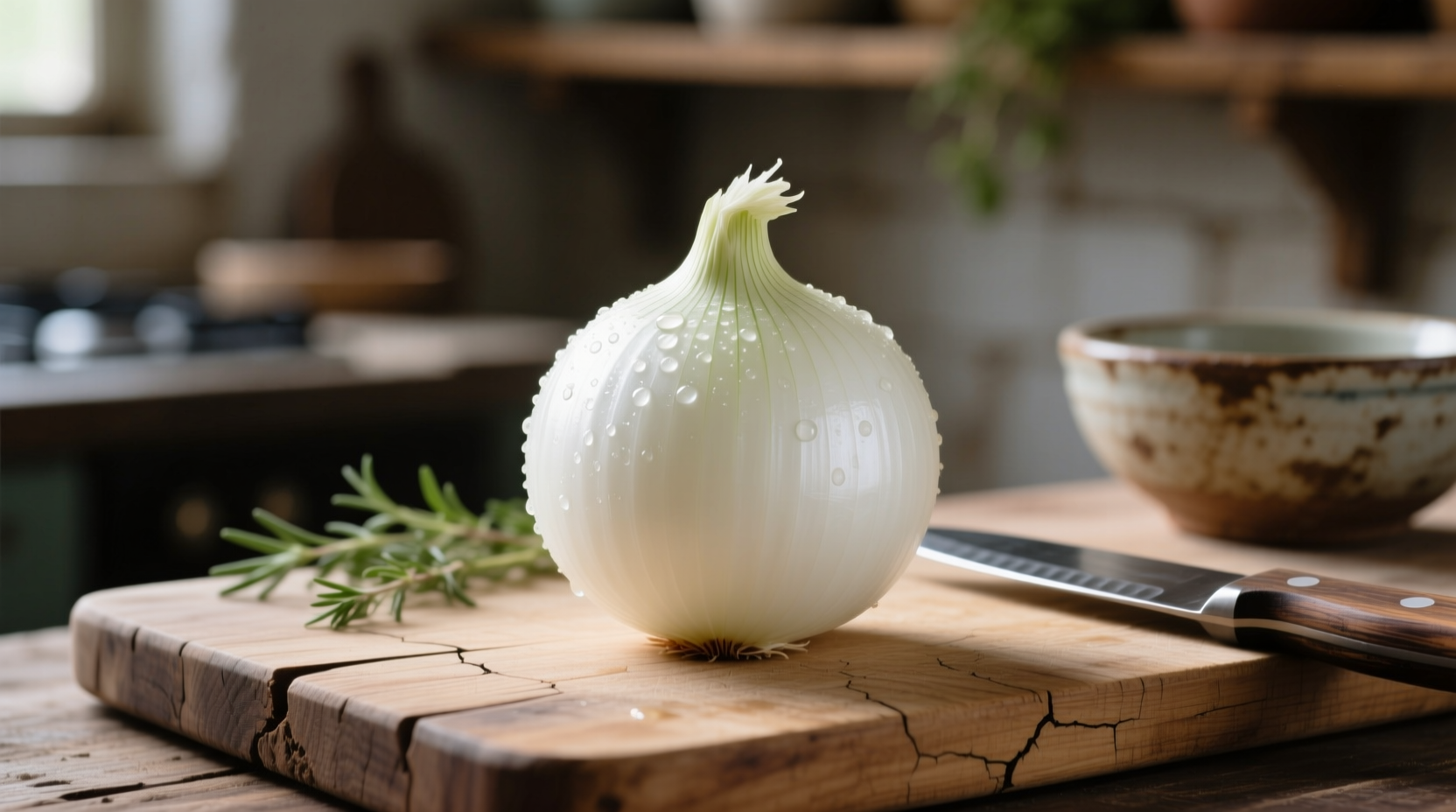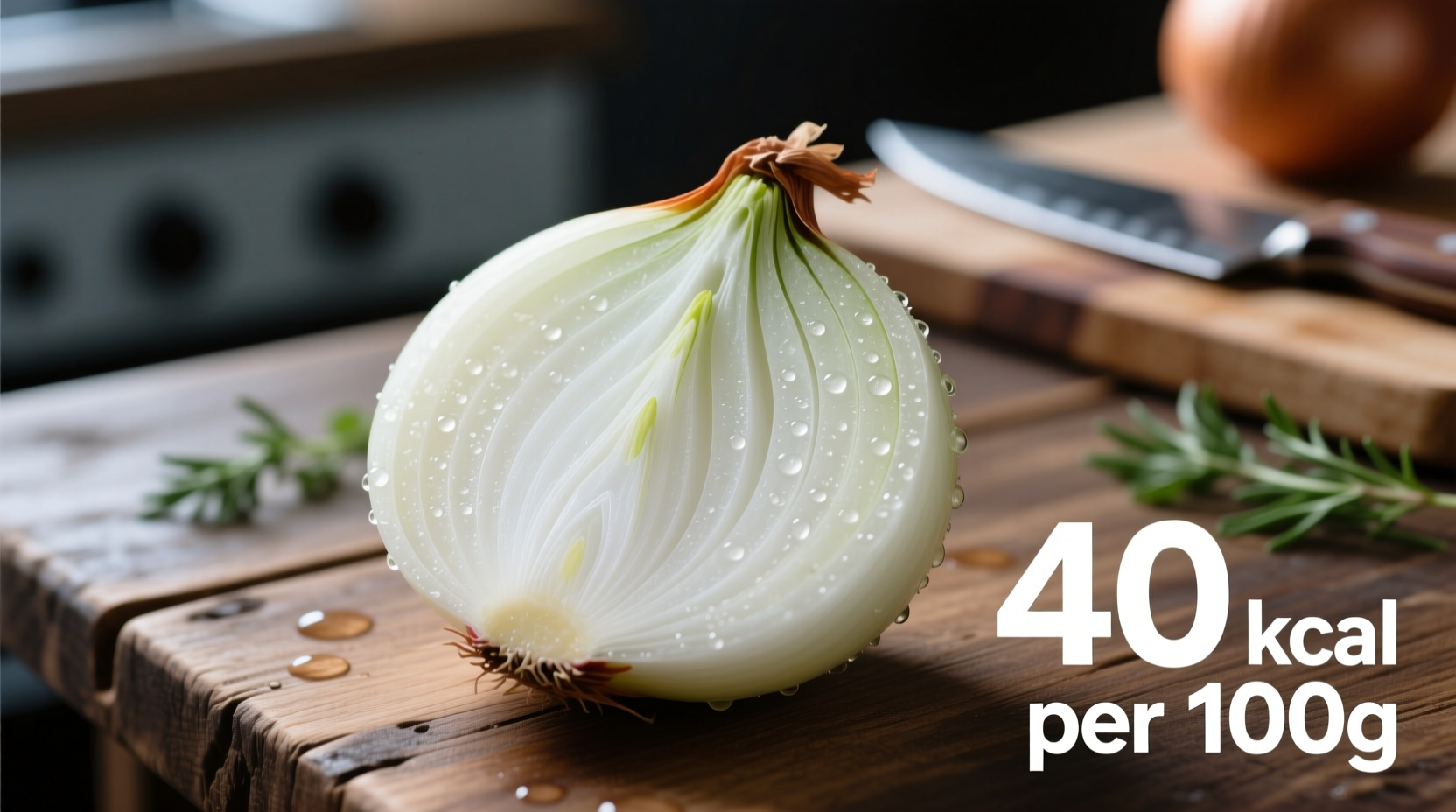Understanding the precise nutritional value of white onions helps home cooks and health-conscious eaters make informed decisions in the kitchen. Whether you're managing calorie intake, following a specific diet plan, or simply curious about this kitchen staple, having accurate information at your fingertips transforms how you incorporate white onions into your meals.
White Onion Nutrition: Beyond the Calorie Count
When evaluating white onions from a nutritional perspective, it's essential to consider more than just calorie content. A medium white onion (approximately 148 grams) provides:
- 59 calories total
- 13.8 grams of carbohydrates
- 2.5 grams of dietary fiber (9% of daily value)
- 1.7 grams of protein
- 7.4mg of vitamin C (12% of daily value)
- 146mg of potassium
Unlike many processed foods, white onions contain zero fat and no cholesterol, making them suitable for virtually any dietary pattern. The natural sugars in white onions (about 5 grams per medium onion) contribute to their characteristic flavor without adding significant calories.

Practical Calorie Measurements for Real-World Cooking
Understanding how white onions translate to actual cooking scenarios matters more than abstract numbers. Here's how white onion calories break down in practical kitchen measurements:
- 1 whole medium white onion (148g): 59 calories
- 1 cup chopped white onion (160g): 64 calories
- 1/2 cup chopped white onion (80g): 32 calories
- 1/4 cup chopped white onion (40g): 16 calories
- 1 tablespoon chopped white onion (10g): 4 calories
These measurements help you accurately track your intake whether you're preparing a stir-fry, adding onions to a salad, or creating a soup base. The mild, crisp flavor of white onions makes them versatile across cuisines while contributing minimal calories to your dishes.
White Onions vs. Other Varieties: Nutritional Comparison
| Nutrient (per 100g) | White Onion | Yellow Onion | Red Onion |
|---|---|---|---|
| Calories | 40 | 40 | 40 |
| Carbohydrates | 9.34g | 9.32g | 9.26g |
| Dietary Fiber | 1.7g | 1.8g | 1.7g |
| Vitamin C | 7.4mg | 7.4mg | 7.4mg |
| Calcium | 23mg | 23mg | 23mg |
| Potassium | 146mg | 146mg | 146mg |
As the comparison table shows, the nutritional differences between onion varieties are minimal. The primary distinctions lie in flavor profiles and culinary applications rather than significant nutritional variations. White onions tend to have a sharper, more pungent flavor compared to yellow onions, while red onions offer a slightly sweeter taste with vibrant color.
Contextual Considerations for White Onion Consumption
Understanding when and how to use white onions requires considering several contextual factors that affect their nutritional impact:
- Cooking methods matter: Raw white onions retain all their vitamin C content, while cooking reduces vitamin levels by approximately 20-30% but increases the bioavailability of certain antioxidants
- Digestive sensitivity: Some individuals experience digestive discomfort from raw onions due to fructans, making cooked preparations more suitable for sensitive digestive systems
- Dietary restrictions: White onions are naturally gluten-free, vegan, and keto-friendly in moderate portions (up to 1/4 cup per serving)
- Flavor concentration: White onions have a more intense flavor than yellow onions, meaning you often need less to achieve the same flavor impact, potentially reducing overall calorie contribution
Practical Applications in Meal Planning
Integrating white onions into your diet requires practical strategies that maximize flavor while managing calorie intake:
For weight management diets, use 1/4 cup chopped white onion (16 calories) as a flavor base instead of higher-calorie alternatives like bacon or butter. The natural sweetness that develops when onions caramelize provides depth without added sugars.
In Mediterranean diet applications, combine white onions with olive oil, tomatoes, and herbs for a flavorful base that stays within recommended fat guidelines. The sulfur compounds in white onions work synergistically with olive oil's healthy fats to enhance nutrient absorption.
When following low-FODMAP diets for digestive health, limit white onion portions to 1/4 cup or use the green tops instead, which contain fewer fructans while still providing onion flavor.
Maximizing Nutritional Benefits Through Preparation
How you prepare white onions significantly impacts their nutritional profile:
- Chopping technique: Finely chopping and letting white onions rest for 10 minutes before use increases allicin production, a beneficial compound with antioxidant properties
- Cooking duration: Light sautéing preserves more nutrients than prolonged cooking; aim for just 3-5 minutes to maintain maximum nutritional value
- Combination foods: Pairing white onions with vitamin C-rich foods like bell peppers enhances iron absorption from plant-based foods
- Storage methods: Keeping white onions in a cool, dark place preserves their nutrient content longer than refrigeration, which can cause moisture buildup and nutrient loss
Professional chefs often use the "sweat" technique rather than caramelizing onions when maximizing nutritional benefits is the priority. This involves cooking onions over medium-low heat with minimal oil just until translucent (about 5 minutes), preserving more heat-sensitive nutrients while still developing flavor.
Frequently Asked Questions
How many calories are in a small white onion?
A small white onion (approximately 70g) contains about 28 calories. This serving provides 2.1 grams of fiber and 3.5 grams of natural sugars, making it a low-calorie option for adding flavor to dishes.
Are white onions good for weight loss?
Yes, white onions can support weight loss efforts as they're low in calories (40 calories per 100g), high in fiber, and add significant flavor without extra fat or sugar. Their natural compounds may also support metabolic health when consumed as part of a balanced diet.
Do cooked white onions have the same calories as raw?
The calorie content remains virtually identical whether white onions are cooked or raw. However, cooking concentrates flavors, meaning you might use less onion to achieve the same taste impact, potentially reducing overall calorie intake from the onion component of your dish.
How do white onions compare nutritionally to green onions?
White onions contain slightly more calories (40 per 100g) compared to green onions (32 per 100g), but green onions provide more vitamin K and vitamin A. White onions offer stronger flavor and are better for cooking, while green onions work well raw with a milder taste profile.
Can diabetics eat white onions?
Yes, white onions are diabetes-friendly with a low glycemic load of 1-2. They contain chromium, which helps regulate blood sugar, and their fiber content slows glucose absorption. The American Diabetes Association recommends including onions as part of a balanced diabetic meal plan.











 浙公网安备
33010002000092号
浙公网安备
33010002000092号 浙B2-20120091-4
浙B2-20120091-4